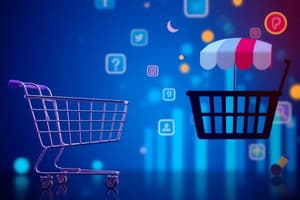Podcast
Questions and Answers
Which of the following is NOT a challenge associated with ICT implementation in business?
Which of the following is NOT a challenge associated with ICT implementation in business?
- Security concerns about data protection
- Compatibility issues between new and existing systems
- The need for ongoing training and development for employees
- High staff turnover due to technology changes (correct)
Which of the following is a type of ICT software used in business?
Which of the following is a type of ICT software used in business?
- A data center
- A wide area network (WAN)
- A mobile phone
- Customer relationship management (CRM) software (correct)
Which of the following is NOT a benefit of successful ICT implementation in business?
Which of the following is NOT a benefit of successful ICT implementation in business?
- Elimination of all data security risks and breaches (correct)
- Improved communication and collaboration among employees
- Enhanced market reach and global customer access
- Reduced operational costs and increased efficiency
Which ICT element is primarily responsible for enabling businesses to connect to the internet and access resources worldwide?
Which ICT element is primarily responsible for enabling businesses to connect to the internet and access resources worldwide?
Which of the following is a key factor in determining the effectiveness of ICT implementation in a business?
Which of the following is a key factor in determining the effectiveness of ICT implementation in a business?
Which of the following ICT applications directly supports the improvement of customer interactions, tracking customer data, and personalizing service?
Which of the following ICT applications directly supports the improvement of customer interactions, tracking customer data, and personalizing service?
Which application of ICT directly enables businesses to conduct commerce online and reach a wider market, including e-shops, online marketplaces, and online payment systems?
Which application of ICT directly enables businesses to conduct commerce online and reach a wider market, including e-shops, online marketplaces, and online payment systems?
Which benefit of ICT in business is directly linked to the ability of businesses to acquire and analyze data to make informed choices?
Which benefit of ICT in business is directly linked to the ability of businesses to acquire and analyze data to make informed choices?
Which of these options is NOT a key application of ICT in business, as outlined in the content?
Which of these options is NOT a key application of ICT in business, as outlined in the content?
Which of the following DOES NOT directly constitute a benefit of ICT in business, as presented in the provided content?
Which of the following DOES NOT directly constitute a benefit of ICT in business, as presented in the provided content?
Which ICT application best aligns with the ability of businesses to track goods and materials within a supply chain, including inventory control and logistics?
Which ICT application best aligns with the ability of businesses to track goods and materials within a supply chain, including inventory control and logistics?
Which of the following statements best reflects the impact of ICT on business efficiency and productivity?
Which of the following statements best reflects the impact of ICT on business efficiency and productivity?
Which of the following ICT applications directly enables businesses to promote their goods or services through digital channels such as search engine optimization (SEO), social media marketing, and online advertising?
Which of the following ICT applications directly enables businesses to promote their goods or services through digital channels such as search engine optimization (SEO), social media marketing, and online advertising?
Flashcards
ICT
ICT
Information and Communication Technology that manages and processes information for businesses.
Automation
Automation
Use of ICT to perform repetitive tasks automatically, enhancing efficiency.
Data Management
Data Management
Collection, storage, retrieval, and analysis of business information using ICT systems.
Collaboration & Teamwork
Collaboration & Teamwork
Signup and view all the flashcards
Customer Relationship Management (CRM)
Customer Relationship Management (CRM)
Signup and view all the flashcards
E-commerce
E-commerce
Signup and view all the flashcards
Supply Chain Management
Supply Chain Management
Signup and view all the flashcards
Benefits of ICT
Benefits of ICT
Signup and view all the flashcards
Global reach
Global reach
Signup and view all the flashcards
High initial investment
High initial investment
Signup and view all the flashcards
Staff training requirements
Staff training requirements
Signup and view all the flashcards
Security concerns
Security concerns
Signup and view all the flashcards
Types of ICT used in business
Types of ICT used in business
Signup and view all the flashcards
Study Notes
Introduction to ICT in Business
- Information and Communication Technology (ICT) encompasses all technologies used to manage, process information, communicate, and support business operations.
- ICT involves hardware (computers, networks), software (applications, systems), and data (information).
- ICT is crucial for improving business efficiency, productivity, and competitiveness.
Key Applications of ICT in Business
- Automation: ICT automates repetitive tasks, freeing up human resources for strategic work, including automated data entry, order processing, and customer service interactions.
- Communication: ICT enables rapid, efficient communication across distances using email, video conferencing, instant messaging, and social media.
- Data Management: ICT systems manage data collection, storage, retrieval, and analysis using databases, data warehouses, and analytics tools.
- Collaboration & Teamwork: ICT facilitates information sharing, project coordination, and effective collaboration among teams and departments, even remotely.
- Customer Relationship Management (CRM): ICT manages customer interactions, tracks data, understands behavior, and personalizes service.
- E-commerce & Online Business: ICT enables online commerce and wider market access via e-shops, online marketplaces, and online payment systems.
- Supply Chain Management: ICT optimizes the flow of goods and materials through tracking, inventory control, and logistics throughout the supply chain.
- Marketing and Sales: ICT promotes products/services via digital channels like SEO, social media marketing, and online advertising.
Benefits of ICT in Business
- Increased efficiency and productivity: Automation and streamlined processes lead to faster turnaround times and higher output.
- Improved decision-making: Access to data and analytics enables informed choices.
- Enhanced customer satisfaction: Personalized service and faster responses improve customer experience.
- Reduced operational costs: Automation and optimized processes decrease expenses.
- Increased competitiveness: Staying ahead of rivals by adopting latest technologies.
- Global reach: Expanding market base and reaching customers worldwide.
Challenges of ICT Implementation in Business
- High initial investment: Implementing new ICT systems is costly.
- Staff training requirements: Employees need training on new technologies.
- Security concerns: Protecting data from cyber threats is critical.
- Compatibility issues: Integrating new systems with existing ones can be challenging.
- Keeping up with rapid technological advancements: Continuous upgrades and adjustments are needed to maintain effectiveness.
- Potential for data breaches and security flaws: Strong security measures are essential.
Types of ICT Used in Business
- Hardware: Computers, servers, networking equipment, mobile devices (smartphones, tablets).
- Software: Operating systems, applications (word processors, spreadsheets, databases), specialized business software (CRM, accounting).
- Networking: Local area networks (LANs), wide area networks (WANs), internet connectivity.
- Data storage: Cloud services, hard drives, data centers.
- Communication: Email, instant messaging, video conferencing, VoIP.
Conclusion
- ICT is essential for modern businesses to succeed in today's competitive environment.
- Successful ICT integration delivers significant advantages in efficiency, productivity, and customer satisfaction.
- Addressing implementation and security challenges is vital for realizing ICT's potential.
Studying That Suits You
Use AI to generate personalized quizzes and flashcards to suit your learning preferences.




